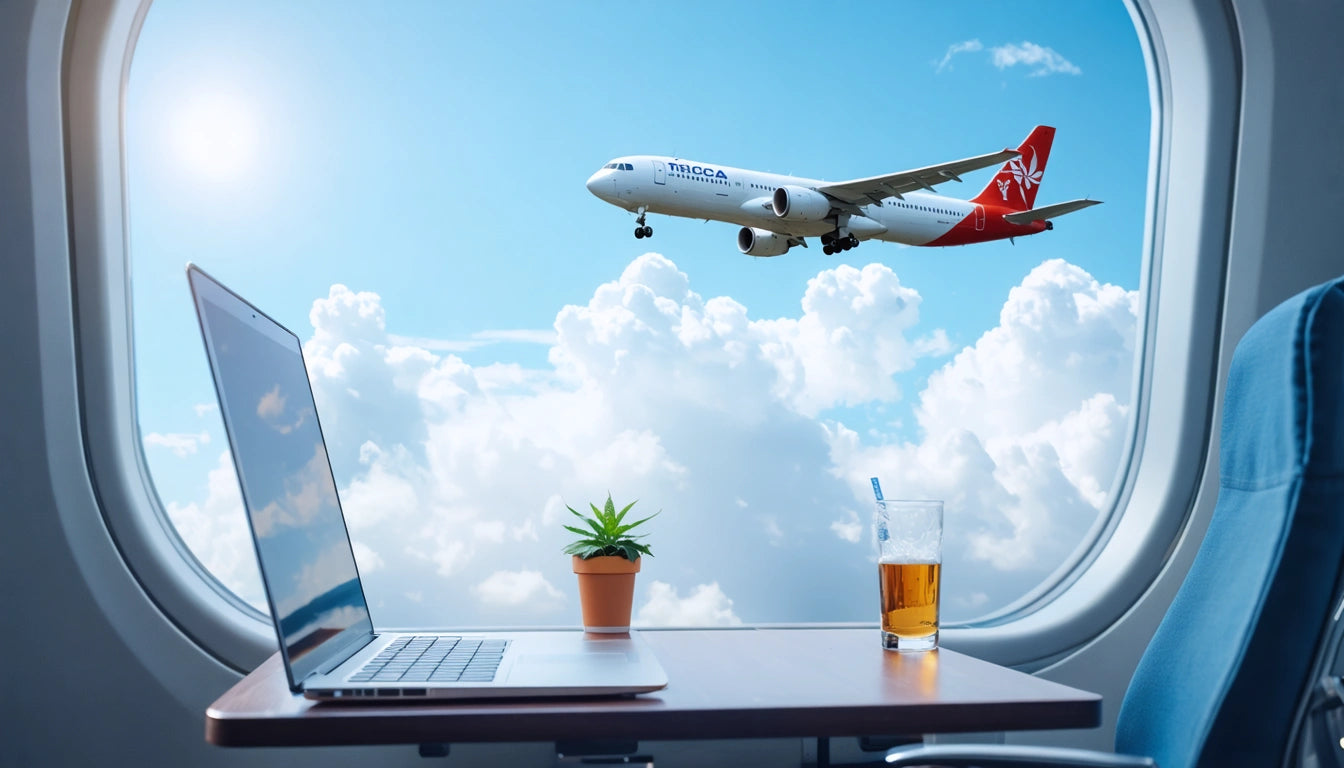Flying with THCA: What You Need to Know
Navigating air travel with cannabis products like THCA flower or vapes requires understanding complex legal frameworks that vary between federal and state jurisdictions. While many consumers wonder if they can take THCA on a plane, the answer involves several important considerations about legality, TSA procedures, and potential risks.
Understanding THCA and Travel Regulations
THCA (tetrahydrocannabinolic acid) is the non-psychoactive precursor to THC found naturally in raw cannabis. Unlike THC, THCA doesn't produce intoxicating effects until it's decarboxylated through heat. This distinction has created a gray area that some consumers believe might make traveling with THCA products safer from a legal perspective.
According to our comprehensive guide on THCA, this compound offers potential therapeutic benefits without the high associated with THC. However, this chemical distinction doesn't necessarily translate to legal clearance for air travel.
Federal vs. State Laws on THCA
The fundamental challenge when asking "can I fly with THCA" stems from the conflict between federal and state regulations:
- Federal law classifies cannabis and its derivatives (including THCA) as Schedule I controlled substances
- Airports and airplanes fall under federal jurisdiction, regardless of state cannabis laws
- The 2018 Farm Bill legalized hemp (cannabis with less than 0.3% THC), but THCA products often exceed this threshold when tested
This creates a complex situation where THCA products that are legal in your departure and arrival states may still violate federal law during air travel. The legal status becomes even more complicated when considering that THCA converts to THC when heated, which happens during standard security screening procedures.
TSA Guidelines for Cannabis Products
The Transportation Security Administration (TSA) maintains clear policies regarding cannabis products:
TSA officers focus primarily on security threats rather than searching for drugs. However, if they discover substances that appear to be cannabis-related during routine screening, they are required to report to local law enforcement. This applies whether you're carrying THCA flower, vapes, or other products.
As outlined in our guide on flying with THC products, TSA's stance doesn't distinguish between THC and THCA from an enforcement perspective.
Flying with Different THCA Products
THCA Flower
For those wondering specifically "can you fly with THCA flower," the risks are significant. Flower products:
- Are easily identifiable during baggage screening
- Emit distinctive odors that may attract attention
- Cannot be easily distinguished from traditional THC-rich cannabis by visual inspection
To maintain freshness during any travel, proper storage is essential. Products like humidity control packs for cannabis storage can help preserve terpenes and prevent drying, though this doesn't address the legality concerns of air travel with these products.
THCA Vapes
The question "can you fly with THCA vape" introduces additional complications:
- Lithium batteries in vape devices must follow TSA guidelines for carry-on luggage
- Vape products face additional scrutiny due to past safety concerns
- The concentrated nature of vapes may result in higher penalties if discovered
Similar to traditional THC vapes, THCA vape products face significant restrictions during air travel, as detailed in our guide on flying with THC vapes.
Other THCA Products
Beyond flower and vapes, consumers may wonder if they can bring THCA on a plane in other forms like tinctures, edibles, or concentrates. While these may be less immediately recognizable, they still fall under federal prohibition and carry similar legal risks during air travel.
Best Practices for Traveling with THCA
If you're considering traveling with THCA products despite the risks, consider these precautions:
- Research both departure and arrival state laws thoroughly
- Maintain original packaging with batch testing information
- Carry any relevant medical documentation if applicable
- Be aware that international travel presents even greater legal complications
The safest approach, however, is to avoid traveling with THCA products altogether, especially by air. The potential legal consequences typically outweigh the benefits of carrying these products across state or international boundaries.
Potential Risks and Legal Consequences
When asking "can I take THCA on a plane," consider these potential outcomes:
- Confiscation of products
- Criminal charges under federal law
- Missed flights and travel disruptions
- Potential inclusion in traveler watchlists
- State-level penalties depending on local laws
The legal distinction between THCA and THC that exists in some state markets provides little protection in the context of federal air travel regulations. THCA extraction and production methods create products that federal authorities still classify as controlled substances.
Travel Alternatives for Cannabis Consumers
Rather than risking legal complications by attempting to fly with THCA products, consider these alternatives:
- Research legal dispensaries at your destination
- Explore legal hemp-derived CBD products that comply with the 0.3% THC threshold
- Consider mail-forwarding services for hemp-derived products where legal
- Investigate medical reciprocity programs if you're a registered patient
For many consumers, the safest approach is purchasing products locally after arriving at your destination, rather than transporting THCA across state lines or international boundaries.
Understanding both federal and state regulations is essential for cannabis consumers who travel. While the question "can you take THCA on a plane" might seem straightforward, the answer involves navigating complex legal territories where the safest path typically avoids carrying these products during air travel altogether.











Leave a comment
All comments are moderated before being published.
This site is protected by hCaptcha and the hCaptcha Privacy Policy and Terms of Service apply.